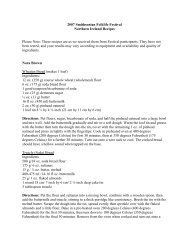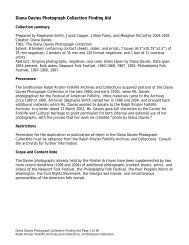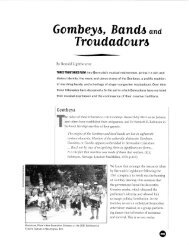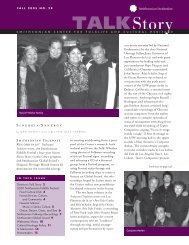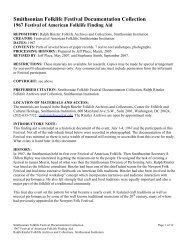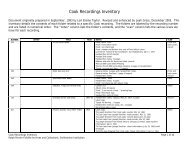Who Owns Traditional Medical Knowledge? - Smithsonian Center ...
Who Owns Traditional Medical Knowledge? - Smithsonian Center ...
Who Owns Traditional Medical Knowledge? - Smithsonian Center ...
You also want an ePaper? Increase the reach of your titles
YUMPU automatically turns print PDFs into web optimized ePapers that Google loves.
MAKING HERITAGE LEGIBLE 169<br />
detailed descriptions of the flora of Malabar that drove commercial trade routes and<br />
colonial exploration, but also because of its seminal influence on the scientific development<br />
of botany, tropical medicine, and medicinal gardens in cosmopolitan centers<br />
of learning like Leiden and Padua. Van Rheede’s conceptualization of Malabar<br />
as “the garden of the world” persuaded him to make a more fundamental set of associations<br />
between landscape and people, and between forests, medicine, and health,<br />
all of which were to have a decisive impact on Dutch colonial responses to deforestation.<br />
We also know that Hortus Malabaricus was the main source for Carl Linnaeus’s<br />
knowledge of Asian tropical flora, which in turn critically influenced the<br />
development of species taxonomy in his Species Plantarum. 36<br />
But even more interestingly, the Hortus Malabaricus held tremendous epistemological<br />
significance in its reliance on local medical knowledge. Unlike other<br />
illustrated herbals compiled at the time, Van Rheede relied almost entirely on indigenous<br />
collaborators: three Konkani Brahmin scholars, who provided textual reference,<br />
but more importantly, Ayurvedic physicians from the Ezhava or low-caste<br />
toddy tappers, who provided the empirical plant knowledge and functional taxonomies<br />
of classification (see Figure 1). As historian Richard Grove describes, the<br />
main Ezhava informant was the well-known healer, Itty Achudan, who not only<br />
shared his community’s secret texts but also selected, procured, and classified the<br />
plants for inclusion in Hortus Malabaricus. 37 In privileging the Ezhava, or non-<br />
Brahmin view of the world, Van Rheede transformed not only Ayurveda itself (often<br />
understood as an orthodox elite Brahminical tradition) but also colonial botany<br />
and thus Western science. Ezhava botanical classifications and medicinal garden<br />
schemes were recreated intact in Leiden. Indeed, Linnaeus is said to have directly<br />
incorporated both the order and the functional taxonomy originally provided by<br />
the Ezhavas. But the real irony here is that although Ezhava ethnobotanical information<br />
may live on in global science (Itty Achudan was considered so influential<br />
that the entire plant genus Achudemia was named after him), the actual role of<br />
Ezhava informants has long been forgotten. Local Ayurvedic knowledge may have<br />
transformed the origins of medical botany and Western science but has been written<br />
out of global history.<br />
Almost 350 years later, Kerala University set out to reverse this extraordinary<br />
history with its new English translation of Hortus Malabaricus in 2003. The famous<br />
text had defied translation for centuries, and attempts to bring out Dutch<br />
and English translations had all failed. Van Rheede’s feat was prodigious in that he<br />
brought out the 12 finely illustrated volumes in Latin, the accepted language for<br />
scientific work in Europe at that time, but he had also employed three other scripts,<br />
the local Malayalam, Arabic and Sanskrit, while plant names also appeared in the<br />
Portuguese and Flemish languages (see Figure 2). Thus, the multilingual volumes,<br />
with their copious introductions, forewords, dedications, references, and certificates<br />
given by Van Rheede to the native physicians, all of which contained extensive<br />
social and historical information about India, had largely remained off-limits<br />
to serious scholars and analysts.



